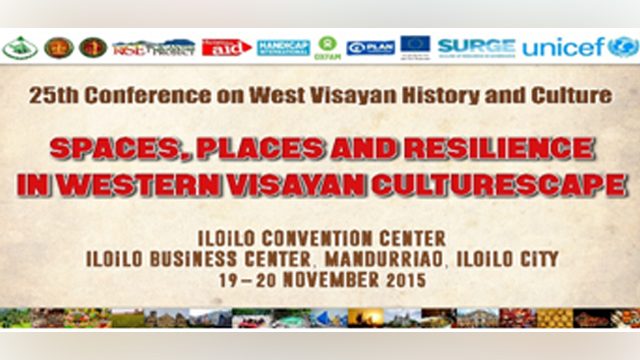SUMMARY
This is AI generated summarization, which may have errors. For context, always refer to the full article.

ILOILO, Philippines – The Center for West Visayan Studies of the University of the Philippines-Visayas (UPV-CWVS) hosted the 25th Conference on West Visayan History and Culture with paper presentations from researches that tackled community disaster risk reduction practices and resilience.
The two-day conference was held from November 19 to 20 at the Iloilo Convention Center. It ran with the theme, “Spaces, Places, and Resilience in West Visayas Culturescape.”
A ‘milestone’ for the school
The event gathered officials from various local governments and regional government agencies, academics, researchers, historians, culture preservation campaigners, graduate students, professionals, members of the civil society, community leaders and advocates of disaster risk reduction and climate change adaptation.
The gathering was opened by two keynote presentations from experts from the University of the Philippines (UP) Diliman.
The first was by Dr Kristoffer Berse from UP-National College of Public Administration and Governance (UP-NCPAG) on the topic: “Unpacking Resilience: Global Priorities, Local Actions.”
The second, Dr Emmanuel Luna from the UP College of Social Work and Community Development (UP-CSWD), discussed “Indigenous Knowledge and Disaster Risk Reduction.”
Professor Jorge Ebay, director of the UPV-CWVS, explained that the conference marked another milestone for the Center for West Visayan Studies as it expanded its role as the vanguard of West Visayan culture, knowledge, legacy and resilience.
Interdisciplinary approach to disasters
The event was part of the contribution of UPV-CWVS on the growing literature on resilience in light of Super Typhoon Yolanda that hit the region two years ago and the real challenge that disasters can bring to Western Visayas because of its increasing vulnerability to meteorological and climate change related risks, underscored Ebay.
The conference provided the avenue to revisit past practices and understand its link to current and ongoing efforts on disaster risk reduction and resilience and will help in building resilient communities in Western Visayas.
The gathering featured around 13 research papers and presentations prepared by 15 professionals from the academe and civil society that deal with the following themes:
- Resilience as Cultural Space
- Disaster in Art Space
- Sacred Spaces and Indigenous Knowledge on Resilience
- Heritage Sites and Historic Urban Centers
- Disaster Resilience and Local Communities
The Center for West Visayan Studies was established in 1975 by UP-Visayas under the College of Arts and Sciences as an institution who answered the need for a concerted effort to preserve and disseminate information on the rich historico-cultural legacy of the region.
As a 40-year old institution, the UPV-CWVS serves as a repository of knowledge about the region, said Joyce Christine Colon, research assistant of UPV.
It is only fitting for UPV-CWVS to be at the forefront of efforts that promote a culture of resilience while exploring inter-, multi-, or trans-disciplinary discourse at the same time, Colon underscored.
The UPV-CWVS holds the annual conference on West Visayan History and Culture by selecting relevant themes. Historically, the annual conference is held at the UPV campus but was later brought to different venues in the province in order to bring knowledge to rural areas and upgrade content in the social studies curriculum of public and private schools.
UPV and CWVS organized this year’s event in partnership with Christian Aid and the United Nations Children’s Fund (UNICEF). It was co-organized by different organizations that carry out efforts on post-Typhoon Yolanda rehabilitation and reconstruction and advocacy work on DRR-CCA in Panay and Region VI. – Rappler.com
Add a comment
How does this make you feel?
There are no comments yet. Add your comment to start the conversation.